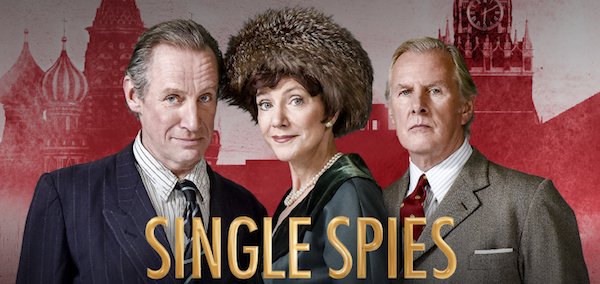Review of the Alan Bennett plays that form Single Spies, at the Richmond Theatre, March 2016. First published in Essential Surrey

In the 1930s, the British security services were penetrated by a group of double agents who passed on many secrets to Stalin’s Soviet Union over the next two decades. The group became known as the Cambridge Circle (they had all been friends from university) and included Kim Philby, Donald Maclean, Guy Burgess and the art historian Sir Anthony Blunt. Burgess and Maclean fled to the USSR in 1951, Philby followed in 1963. Blunt was granted immunity from prosecution and anonymity on the basis he cooperated with the authorities.
Alan Bennett’s Single Spies, at the Richmond Theatre until Saturday, actually consists of two plays. The first is an adaptation of the script for the 1983 TV movie An Englishman Abroad, about a meeting in Moscow between the actress Coral Browne and Guy Burgess. The second is A Question of Attribution, an imagined encounter between the Queen and Blunt, who was Surveyor of the Queen’s Pictures until he was exposed as a traitor and stripped of his knighthood in 1979.
In the first piece Nicholas Farrell conveys the louche, charming, drunken Burgess well; a man who misses the society of others, stuck in a Moscow flat with just one record, the suit he fled England in, no whisky or English cigarettes and missing, above all, gossipy conversation. Given an audience (Browne) he talks nonstop, a man desperate to be distinctive and extraordinary in a country where the individual was secondary to the system.
Although performed well, An Englishman Abroad doesn’t really work in the theatre, consisting as it does of numerous expositional monologues addressed directly to the audience, and just one real scene between Burgess and Browne. In fact, this theatrical version often seems to be simply an aide memoire for those who saw the original TV film.
In the second play, A Question of Attribution, Blunt and ‘HMQ’ spar over the nature of fake and forgery, of things not being what they seem, and about how something can be accepted as genuine because of its history and provenance. “I was talking about art,” says Blunt. “I’m not sure [the queen] was.”
David Robb (Dr Clarkson in Downton Abbey) gives a measured performance as the cold, uptight Sir Anthony Blunt, a man who gives nothing away, either emotionally, or to the MI5 officer who is trying to get information from him about other members of the spy circle. In this very gentlemanly interrogation, the discussion is also frequently ostensibly about art, but the subtext is obvious.
Although Bennett’s wit and gift for aphorism is present throughout both plays, there is no real dramatic tension in either, nor any emotional involvement for the audience. This (plus the fact that the heating in the theatre seemed to be cranked up as high as it would go) may be the reason the person sitting next to me nodded off halfway through.
Bennett fans may enjoy it, but it’s a disappointing evening for others.
